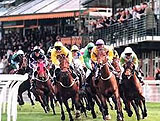Education:
Eton and Christ Church, Oxford
Family:
Rosebery was the eldest son and the third of four children. He was
married to Hannah de Rothschild, and had two sons and two daughters
Interests:
Horseracing (he won the Derby three times), shooting,
sailing, collecting books.
Biography
Staunch upholder
The Earl of Rosebery did
not enjoy the success in office of his Liberal predecessor
Gladstone. His 15-month term as prime minister suffered from
divisions within his party and Cabinet. He is best known today as a
staunch upholder of the British Empire.
Born Archibald Primrose
into a Scottish aristocratic family, Rosebery attended Eton and
Christ Church, Oxford, where he developed an interest in both
politics and horseracing.

While at
Oxford, Primrose succeeded to his grandfather's title as 5th Earl of
Rosebery in 1868, and took up his seat in the House of Lords. A year
later Rosebery bought his first racehorse, Ladas, against university
rules.
Offered a choice by the
university authorities between selling his horse or abandoning his
studies, he chose the racehorse.
Rosebery first became a
public figure when he managed Gladstone's successful Midlothian
Campaign in 1879.
In 1881 Gladstone persuaded him to take up
the post of Under Secretary at the Home Office, with special responsibility for Scotland.
|